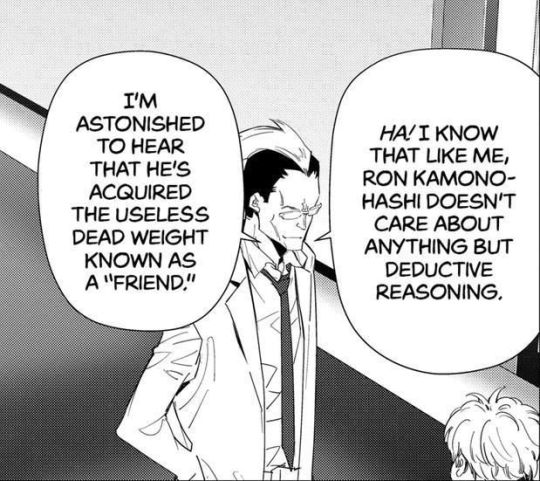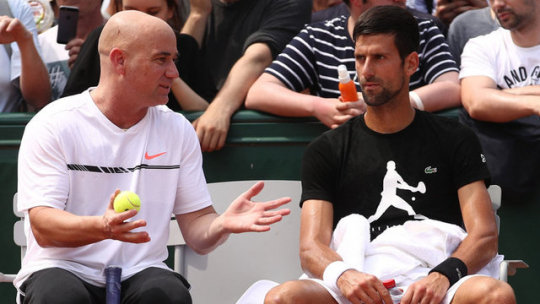#even milo acknowledges their partnership
Text
it's funny how dr. hirsch assumed that toto was ron's lover. i mean- actually almost everyone they stumble upon has this thought in mind, and it just cracks me up how both toto and ron don't even have the time to condemn it sometimes (the misunderstanding) because of the crime and mischief happening around them—




read from right to left
.
.
and despite toto clarifying to dr. hirsch that he's just ron's friend.. this happened💀


AND ALSO I'VE NOTICED THE FACT THAT EVERYTIME THIS HAPPENS RON NEVER REALLY TRIES TO DENY IT- I'M DONE. LITERALLY.
.
.
EVEN MILO ACKNOWLEDGES THEIR PARTNERSHIP >.<


I JUST CAN'T WITH THEM ANYMORE. AND I'M DYING FOR THE NEXT CHAPTER SO PLS AUTHOR JUST FEED ME ALREADY!!@+$+#!*;#)#+-$}£{€=¢÷`§`[©=
#it's a cute misunderstanding but i too would probably think that they're together 😭#spoilers i guess#THEIR DYNAMIC IS MY EVERYTHING#ron kamonohashi#totomaru isshiki#deranged detective#actually tototo is ron's partner-#but does that even make a difference?#i don't know either#even milo acknowledges their partnership#i luv them#misunderstanding..? i guess so#hirsch was giving: “tsk- 'friend' my ass” vibes😭#it's a canon event#rontoto#rkdd
288 notes
·
View notes
Note
Do you have any favorite ships or relationship dynamics that you really like? (Not asking about any endgame stuff, only what the author personally likes from the cast). Love your writing and I hope that you have a wonderful day! :D
Aw heck, pretty sure someone asked this but it’s good to revisit
I do enjoy the dynamic between a lot of those we’ve already kinda seen honestly:
Mom and Yosuke’s weird little tug of war where she constantly hounds him and Yosuke rejects her and the idea of being likened to her,
Jonathan and Nathaniel’s casual partnership wherein they have relations yet aren’t officially “dating”, and are absolutely open about seeing others as well. They’re both goddamn fine art nerds and like ??? I love it???
I actually really do like Cyrus and Ten as well, like most people. I think they’re both sweet together
HOWEVER I can’t really say I don’t like a bit of f/f myself. I also do think Nine and Ten are kind of an interesting dynamic. This can also be said of 5/6′s relationship, which I cherish writing ♥. For both pairings, there’s a lot of affection and support, even if it’s presented in different ways between each character.
Lucius and The Overseer’s precise relation is not known, but I can indeed see them together even though I’ve seen many readers interpret their relationship as more friendly. Lucius is definitely the more open of the two, and The Overseer is one who struggles to show his affection in personal ways. He values respect over most anything else, but he’s shown isn’t incapable of feeling when he’s spoken privately with his associate. Idk, it’s a dynamic I’m a sucker for.
As for other pairings, there’s consideration for Milos and Lilah despite us hardly knowing anything about whatever involvement they once had (Lilah seems not to want to acknowledge it as personal, though). Just on face value alone, we have this roughened older man who’s probably a good enough challenge for a woman who likes to give or receive pain, so one could argue for their pairing.
The only other person I can think of that is interested in this kind of thing [and is overtly sexual] is Micah, whom we know nothing of Lilah’s relationship to, but who I honestly think could fit her style. Considering they’re both people with freaky interests and dyed hair, it’s weirdly fitting!
There’s a volley of other dynamics you can probably drum up. Two’s the caring brother type, Four’s like a fun valley girl, Violet and Eight both have this antisocial-but-social dynamic, etc. You could quite actually ship anyone with anyone else, lmao.
4 notes
·
View notes
Text
Milo Drowssap Cavendish-Dakota
Martin Murphy and his family were on the run. After Milo's birth, Murphy's Law had increased to accommodate the fact that a new boy had been born with the Extreme Hereditary Murphy's Law. There had been unrest in the neighborhood following the significant increase in Murphy's Law, but it hadn't seemed serious... Until it suddenly was. They had to flee into the night, as unmarked black vans made to surround their house. Fortunately there's an aspect to Murphy's Law that it's a force that will make sure it's passed down to the next generation. That, and Martin purposefully rigged the main waterline under the street to explode to help cover their escape. Martin and his family had at first made their escape in the family RV, but they knew they would have to part with it if they didn't want to be spotted. They ditched the RV in a ditch by a ravine several miles outside of the city, and they started to make their way on foot the best they could. Martin grit his teeth, he would have to steal a car. He didn't much like the idea, but it was the best he could think to do. He would spend the next few weeks wondering over what happened next. He would remember the chaos, all the car alarms in the parking garage going off in near unison. The sprinklers inexplicably turned on, and Martin yelled for Brigitte to take the kids and run. The suits that had been following them, found them and rounded them back up...minus one family member. Milo. Martin didn't dare risk asking Brigitte what had happened, even though he desperately wanted to know, it was best to not draw attention to the fact that they had missed capturing a Murphy. Murphy's Law wouldn't let Milo get killed, or at least—Martin hoped against hope that he was right about that. In all the chaos, the agents didn't even realize that they didn't have Milo. Martin only prayed that he would be found by someone that could care for him. -line break- It was bad enough that they had been stranded in this time period, but their current plan was to go with the cover of 'Pistachio Cart Vendors'. Dakota had been quick to point out that was their most plausible employment now that they had fallen out of contact with the Bureau of Time Travel, but that didn't mean Cavendish had to like it. Cavendish had stationed himself nearby a busy mall with a large parking structure, only to have to move the cart when a sudden cacophony of car alarms nearly deafened him. Cavendish walked around the front of the cart to free the wheels from the breaks. He saw something move out of the corner of his eyes and get near the cart. A harried woman, who was stashing something in a side panel of the cart. "What do you think you're—" "Please," the woman shot him a desperate look, "Look after Milo—please." The woman turned and fled back towards the parking structure. Cavendish peered into the cart's side-storage, and his eyebrows shot up in surprise. A crying baby boy, wearing a burgundy onesie with purple stripes, looked up to him and started to squirm. There was a full diaper bag left along side him, obviously hastily packed. The baby's wide pleading eyes, coupled with the fact that Cavendish had a sudden uneasy feeling about the shouts coming from the parking structure... Cavendish knew, he had to get far away. Cavendish took the cart and hurried away, the securing the baby's safety the only thing on his mind. -line break- Dakota had been holding down the fort at the 'H+G' Water Treatment Co. hideout. Spending most of the day trying raise a signal on their main communicator. None of the communicators that were sprinkled around town had worked. Not the one in the photo booth, not the one in the basement of the deli on 4th street (great sandwiches as always though, so their visit wasn't a total loss), and definitely not their portable communicator. They also hadn't been able to locate Brick and Savannah, so that was worrying. No amount of fiddling got him any signal. None, nada— the communicator was just flat out receiving nothing. The communicators had all turned on, but they hadn't even detected a signal from the future. Cavendish and Dakota were officially Stranded Time Travelers. Dakota heard a knock at the door, three knocks at the middle of the door, and one knock at the top. Cavendish and Dakota had long worked out a sort of special 'secret knock', unique to their partnership. Cavendish would give three knocks at the middle at the door, one at the very top. Dakota, being shorter, would knock three times at the middle before tapping out the familiar 'shave and a haircut' near the bottom of the door. "Vinnie," Cavendish's unique British voice called out from behind the door, "be a dear and open the door...my arms are a bit full I'm afraid." "Oooh," Dakota said, interest peaked, "Did you pick up some food or—" Dakota paused as he opened the door, his eyebrows shooting up above his glasses. "Uh." Dakota said, absolutely dumbfounded at the sight of his partner carrying a strange baby, "I'm hoping you have a good explanation for this?" As he was regaling his tale to Dakota, Dakota took the baby, who was apparently named Milo, in his arms to change his diaper. "So...Milo's mom told you to look after him?" Dakota wondered aloud as he swaddled the still upset baby in the hopes of calming him down, "I wonder what could have happened that she'd be willing to leave her baby with a stranger?" Cavendish sighed, "I wish I knew- it seemed she was in some trouble...like someone was pursuing her?" Cavendish speculated aloud, "You should have heard the chaos at that parking garage- whatever was happening wasn't anything good." "Well, it's good you were there to get the kid away from there." Dakota acknowledged as he set about preparing a bottle for, a much calmer, baby boy. "How'd you get so good with kids?" Cavendish marveled as Dakota handed him Milo while he heated up the baby formula, "Not that I'm complaining mind you." Dakota shrugged, "I got a lot of cousins- you've seen my family photos, the Drowssap family reunion basically was a child wrangling practice course." "Speaking of family," Cavendish said as he cradled Milo close to his chest, "Should we report the child to the authorities?" Dakota shook his head, "No I agree with your gut on this one, there was something after that lady. We don't know who we can trust with the kids' safety; not to mention that we'd be interrogated as to just who we are..." "Point taken," Cavendish coincides, "don't want to risk blowing our cover." Dakota scooped Milo back up and offered him the bottle. The little child took to the bottle very eagerly, obviously very hungry. "Besides," Dakota chuckled at Milo's adorable happy noises, "between the two of us, we can care for a baby." "Yes, the two of us can handle anything thrown our way." Cavendish smiled as he observed Milo give out a contented sigh, "How hard can caring for one child be?" End Chapter One
#mml fanfiction#mml#milo murphy's law#pistachio protectors#dakavendish#balthazar cavendish#vinnie dakota
70 notes
·
View notes
Link
A spiritual activist group known for taking on the religious right and conservative policy is splintering over its leader’s decision to enlist a lawyer who also represents prominent alt-right figures.
The Satanic Temple (TST) a nontheistic religious group that says it is dedicated to humanistic values, evidence-based scientific inquiry, and the separation of church and state, is currently suing Twitter for religious discrimination. TST argues it was not only unable to effectively report threats to its headquarters on the platform, but also that when its leader, who uses the pseudonym Lucien Greaves, spoke out, he was punished by being temporarily suspended.
Greaves’s decision to work with Marc Randazza, a lawyer whose other clients include Infowars’ Alex Jones and a number of neo-Nazis and white supremacists, has led to a fracture within TST. The Los Angeles chapter of the group has disaffiliated in protest, calling Randazza a “Twitter troll and an agent of the alt-right,” while the co-head of the New York chapter has resigned and left the organization.
The controversy over Greaves’s engagement of Randazza has crystallized wider debates within the organization. For Greaves and his allies, TST’s primary mission is to defend principles of personal sovereignty like free speech and separation of church and state, often by taking advantage of legal religious liberty exemptions. Greaves has frequently argued that this sovereignty is sacrosanct, even for views he finds repugnant: He has, for example, defended the right of ultra-conservative firebrand Milo Yiannopoulos to speak at California Polytechnic University after students purporting to be Satanists led a protest against him.
But for many of the progressive activists drawn to TST for its high-profile commitment to left-wing advocacy work, TST’s partnership with Randazza, and willingness to overlook his more troubling clientele, is a worrying sign that the organization is too willing to let the voices of its leadership — many of whom are straight white men — crowd out the wishes of a more diverse membership.
The fracture within TST reveals the complications and ambiguities inherent in activism in the age of Trump. It also raises questions about the responsibility of broader activist groups, including religious organizations, to its members.
The Satanic Temple has been blending trolling and activism since it was founded in 2012 by two friends, Malcolm Jerry and Lucien Greaves (both pseudonyms). Greaves is the organization’s only public spokesperson and de facto head.
The group gained prominence in 2013, when some members held a mock rally — complete with theatrical black flowing robes — celebrating Florida governor Rick Scott, who had recently signed a law allowing students to read inspirational messages at school events. While that law was designed primarily to allow Christian students to evangelize in school, TST grabbed media attention by praising Scott for reaffirming “our American freedom to practice our faith openly, allowing our Satanic children the freedom to pray in school.”
In 2016, TST again made headlines for using religious liberty exemptions to get around Texas’s then-new “fetal burial rule,” which mandated that all fetal remains, including those that were the result of abortion, be officially buried or cremated. Because the organization formally holds that fetuses are not people, TST threatened to file injunctions against any planned enforcements of the law on religious liberty grounds.
It’s unclear exactly how many members the organization has. Its Facebook page has about 85,000 likes and its Facebook members’ forum has 7,000 members. For many Satanic Temple adherents, TST provides a moral framework, a place to conduct spiritual rituals with like-minded people, and a chance to reify dearly-held values.
This latest controversy began in January, when former child actor Corey Feldman, who’s previously claimed “demonic forces” have influenced his life, retweeted another user, LaurieGatta1, calling for the Satanic Temple headquarters in Salem, Massachusetts, to be burned down.
LaurieGatta1’s tweet, which has since been deleted, read: “I doubt nothing anymore. I have em. In Salem MA. Opened a Satanic Church last year!!! The Witches are evil. And Satanists and Cults are VERY real! W a church like this Should not exist! Burn it! Blame Hillary I don’t care! It’s gutta go. If anyone likes this idea they r FKEd.”
Lucien Greaves retweeted it, asking his followers to report the original tweet as harassment to Twitter. Instead, Greaves’s own account was suspended indefinitely (it has since been restored).
The TST is now suing Twitter for religious discrimination. “When Twitter is going to choose to treat one religious group differently than another, in a way that dehumanizes us, that sets up a dangerous precedent. … There are deeper ramifications for society at large when social media can suspend your account just because of discrimination,” he told the Washington Post.
Greaves said that the only lawyer who would take his case pro bono was Randazza, a lawyer whose defense of free speech — no matter how repugnant the message — has led to him to defend a founder of the neo-Nazi website the Daily Stormer. Randazza is also defending far-right conspiracy theorist Alex Jones against several families of the victims in the Sandy Hook, Connecticut, shooting, who are suing him for defamation for propagating the idea that the massacre was a hoax.
However, many heads of individual local chapters expressed concern about retaining Randazza, especially because Greaves and TST were also simultaneously publicly fundraising for the suit despite being represented pro bono. (TST chapter heads and local councils organize and run local events and meetings, and funnel at least 90 percent of any profit from local events and fundraisers to the national level).
Emma Story, a former New York City TST chapter leader, said she expressed her concerns about Randazza to the national council several months ago. “We got a polite but non-useful reply about how lawyers represent all kinds of clients,” she told Vox. By mid-June, she said, other chapter heads had also express concern about Randazza’s affiliations, and in early July she and other chapter heads sent a longer formal letter to TST’s national council. They have yet to receive a response.
This week, the LA chapter disaffiliated from TST, branding itself the Satanic Collective, over concerns about Randazza. Story also resigned from the New York branch.
In a Medium post explaining her departure, Story wrote, “Randazza is not just another lawyer and it’s disingenuous to pretend that he is. … He has appeared on Alex Jones’s InfoWars again and again — not merely to discuss the Sandy Hook case but to express a whole variety of opinions about everything from Starbucks’s racial bias training to ‘the culture of victimhood’ in the United States.” Randazza has, she noted, appeared on InfoWars to warn: “one day in the future, there will be the uber victim: it will be one victim, to rule over all of them. There will be a black lesbian in a wheelchair with an eye patch and every single possible victimization and she will rule. … It’s a dystopian fairy tale.”
For Story, TST’s affiliation with Randazza highlights a wider issue within the organization: its unwillingness to prioritize the wishes of its most vulnerable and marginalized members. TST has, in her view, a diversity problem, skewing toward a generally privileged and largely white demographic.
“It’s not a coincidence,” Story wrote, “that the people who are leaving TST over this issue right now are predominantly members of the very same vulnerable groups we say we want to attract.” Still, members who are people of color, LGBTQ, or from other marginalized groups may feel uncomfortable with their religious organization doing business with someone who has not only defended, but also exhibited collegial behavior toward personalities like Jones.
In a statement made via Patreon, Greaves doubled down on his decision to work with Randazza. “I didn’t take the time to learn his politics, and I still don’t care what they are. He’s not representing our views, he’s defending our legal rights in court. He is a tool that has been made available to our enemies to their benefit. If we deny ourselves the same tools on the grounds that they’ve been used by our enemies, have we not merely forfeited our own fight?”
In a subsequent email to Vox, Greaves stressed that he believed that most chapter heads supported his decision to keep working with Randazza. He added, “We are not giving him a courtroom platform to pontificate about his political views, nor should those views be of consequence to us. [Refusing his services] would do nothing to hurt the alt right, it would merely hurt us.”
He acknowledged that national leadership had not replied to the initial letter of concern from some chapter heads, arguing that the organization was focused on upcoming projects. “The Satanic Temple is run by a small, overworked band of volunteers,” he wrote, “We’re still a young organization working out communication and administration issues, but we are deeply concerned about the well-being of all chapters and don’t disregard any internal disputes, nor do we disregard any concerns as superfluous even if we think they are misguided.”
Chalice Blythe, a member of TST’s national council, said in a statement that “a good portion of initially concerned chapter heads were given thorough explanations” about TST’s relationship with Randazza, and “felt their concerns were adequately addressed, acknowledged, and are in support of the standing of the lawsuit and retention of the lawyer.”
The debate about what the Satanic Temple is, or should be, and the degree to which its advocacy work demands a rejection of people like Randazza, is about far more than the politics of a single organization. Rather, it speaks to the degree to which even progressive organizations have been under increasing ideological strain in a political landscape in which news coverage of neo-Nazis and conspiracy theories has become, in essence, the new normal.
As a social justice organization, and as a religion devoted to celebrating personal autonomy, TST sees itself as a champion of unlimited free speech, and its choice of lawyer reflects that. But as a religion whose adherents are drawn to it because of their passion for social justice, and desire to advocate for the vulnerable, TST also runs the risk of alienating its members. In this, TST’s dual roles — as an activist free speech organization and as a welcoming religious space for a non-theistic community — may be in conflict.
The debate raging in TST, in other words, is ultimately a debate about the nature and limits of activism in the age of President Donald Trump.
As one current chapter head, who wished to remain anonymous, put it in an email to Vox: “We came into TST thinking it would be an organization that stands for something. I would rather not take the Twitter case than hire someone who represents members of the alt-right and Alex Jones. We know Lucien is not someone who has alt-right ideologies, but I would like to think he would consider all the members who are People of Color, LGBTQ+, and some Jewish members who have expressed discomfort with the idea of Randazza representing us.”
Original Source -> The Satanic Temple is divided over its leader’s decision to hire Alex Jones’s lawyer
via The Conservative Brief
0 notes
Text
New Styles of Parenting Are Revolutionizing the American Family
By Anna Sanford, AlterNet, August 2, 2017
At 31, with a successful career as an author and artist, Lauren Brim felt her life was near perfect. “I was working for myself and making art,” she told Washington Post reporter Britany Robinson. “I had great friends.”
Yet, despite the happiness and privilege life afforded her, Lauren felt something was missing: a baby.
She had been through many relationships, even seeking help from relationship coaches and through hypnosis, all with the intention of finding a life partner and beginning a family. But with little success and declining hope, she wondered if there might be another way to begin a family. Why wait for a husband to have kids with? She could do it with someone else.
Brim approached one of her friends and after months of discussion about everything from spirituality and schooling to medical care and finances, the two decided to have a baby, on the grounds that they would take an equal role in parenting and their relationship would remain platonic.
Brim’s story is representative of larger cultural shifts in how women view marriage, family, partners, and parenting. A recent study by Lake Research Partners and Family Story, a nonprofit that explores and preserves family histories, revealed that more than half of women think there should be more ways to raise children with someone who is not a romantic partner. Fifty-eight percent of unmarried mothers say they would consider raising a child with someone who is not a spouse or romantic partner.
Whether it’s choosing to focus on a career, waiting to be financially stable and independent of someone else or still searching for the right person, women are staying single longer than ever before. A Pew study found that the average age for women to get married, 27.4 years, is at an all-time high. With women getting married later, childbearing has fallen sharply. Kenneth Johnson, a sociology professor and demographer at the University of New Hampshire, estimates that roughly 500,000 fewer babies are now being born per year than would have been the case had the fertility rates of the mid-2000s continued.
Despite the decline, many women in their 20s and 30s still want children. A Gallup study in 2013 found that only 6 percent of American adults--both men and women--don’t have kids and don’t want them. Surprisingly, younger Americans are increasingly interested in having large families. When asked to name an “ideal number of children to have,” American under the age of 30 gave an average response of 2.7 kids, higher than any other age group.
This conflation of factors--declining marriage and fertility rates, yet an increased desire for children--has prompted women to find ways to have children outside of traditional methods.
“The family is always evolving,” said Nicole Rodgers, the founder and co-director of Family Story. “We tend to forget that if you take the long view of history, the independent nuclear family is a bit of an aberration. It was never really the ‘tradition’ many think it was, and in fact, for much of our history, multi-generational homes were far more common. Most women understand that family can take many forms, and that a good family is simply a group of people bonded together by love, care and support for each other.”
Co-parenting, a term previously used to describe a couple who continues to parent affably after they break up, is evolving to mean something else: a partnership of two or more people who come together to raise a child, regardless of marriage or romance. Also known as platonic parenting, adults are increasingly joining forces and thereby shifting and expanding the concept of the family. In the Family Story and Lake Researchers’ survey, 60 percent of women believed that children do best with multiple adults invested and helping, but that two married parents are not necessary.
“Different cultures and communities, in this country, and around the world, have always done family in all sorts of different ways,” said Rodgers. “Black families, for example, have a tradition of raising children collectively in ways that transcend blood and legal ties. I think you can argue that is a far better and more natural way to raise kids.”
As the model of the family continues to evolve, services are likewise developing to help and foster support for adults interested in opportunities outside of tradition. Modamily, Coparents, and Family by Design are all sites where people can create profiles to meet compatible strangers, much like Match.com or OkCupid. However, instead of seeking some type of romantic or sexual relationship, users intend to find a partner in platonic parenting.
That’s how Tatijiana Busic, a 35-year-old single mom who wanted a second child, met Brendan Schulz, a 44-year-old gay man looking for someone to raise a kid with. They have a written agreement that outlines an even share in finances and time spent with their son, Milo.
Despite the planning and amiability they have cultivated in their relationship, Schulz acknowledges that it requires an enormous amount of trust. Platonic parenting can create many complications, entirely different from married or divorced parents. There is little legal stipulation for co-parents, especially when there are more than two involved. Coparents.com encourages individuals to get legal counsel before committing to raise a child.
“Families come in many forms, and are always evolving,” said Rodgers. “The biggest problem we face is that our current policies and practices support so few of them.”
Nonetheless, with time, the laws will reflect how mindsets have changed. Rodgers believes social and economic mandates that assume what a family should be are hurting everyone. “Our survey shows that women are pretty open-minded about building lives and raising families, in all sorts of ways.”
0 notes
Photo

Latest story from https://movietvtechgeeks.com/andre-agassi-proves-asset-novak-djokovic-french-open/
Andre Agassi proves an asset for Novak Djokovic at French Open
Andre Agassi was originally a temporary addition for Novak Djokovic's coaching staff, but after his 2017 French Open first round win, he may be keeping him on longer. At least, that's the plan for Djokovic. If Novak Djokovic was hoping to take a little pressure and attention off himself after some rough results, he might very well have found the perfect way to do that by adding Andre Agassi as a coaching consultant of sorts for the French Open. Well, for up to a week of the tournament, anyway. With Agassi seated in the stands, generally expressionless during the match and silent afterward, the No. 2-seeded Djokovic was not always at his clean-swinging best while beating Marcel Granollers 6-3, 6-4, 6-2 on Monday to begin the defense of the title that allowed him to complete a career Grand Slam at Roland Garros a year ago. "I mean, it's hard to say whether there is significant difference on the court, because it's only a few days that we are together," Djokovic said. "So it's going to take a little bit of time. ... I'm patient and, for us, this is a great way to start off our collaboration and friendship and get to know each other and then see where it takes us." On a relatively quiet Day 2, Rafael Nadal started his pursuit of a record 10th French Open championship with a 6-1, 6-4, 6-1 victory over Benoit Paire. Other seeded men advancing included No. 5 Milos Raonic, No. 7 Marin Cilic and No. 10 David Goffin, while No. 14 Jack Sock, the top-ranked U.S. man, and No. 31 Gilles Simon - both in Nadal's section of the draw - plus No. 32 Mischa Zverev all lost. Defending women's champion Garbine Muguruza and former No. 1 Caroline Wozniacki won in straight sets, but two seeded American women joined Sock on the way out: No. 19 CoCo Vandeweghe and No. 25 Lauren Davis. Leave it to the No. 4-seeded Nadal to win relatively simply and then lament a portion of his performance. "For me," he said, "it's important to serve a little bit better than what I did today." Djokovic made it sound as if Agassi's role right now is more about offering life advice than tennis tips. Sunglasses perched atop his shaved pate, leaning forward with his chin resting on his hands and elbows on his knees, Agassi occasionally applauded during the 2½-hour first-round match. Later, Agassi - who counts the 1999 French Open among his eight Grand Slam titles - declined to take questions from a reporter. Djokovic, for his part, had plenty to say about their partnership, which sounds more like a brief experiment than the start of a long-term arrangement, even if that's what the Serb insisted he hopes it can become. "He has a lot to share with me outside and inside of the tennis lines. I'm really enjoying it so far." "Well, he's going to stay ... I hope, 'til the end of this week. Then he has to leave, because he has some scheduled ... things that he cannot reschedule. So that's all," said Djokovic, whose 29 unforced errors were one more than Granollers' total. "I'm going to try to use the time spent with him as best as I can, as best as we can. So far, plenty of information, plenty of things to kind of process." https://twitter.com/ATPWorldTour/status/869215793275449345 A year ago, when Djokovic finally fulfilled his quest to win a trophy in Paris, he was working with Boris Becker - who was on hand Monday and visited with Agassi - and Marian Vajda. But Djokovic split with those coaches, as well as other members of his entourage, hoping to regain the groove that made him the first man in nearly a half-century to win four consecutive majors. Since then, though, the highlight for Djokovic was a runner-up finish at the U.S. Open. Otherwise, he lost his No. 1 ranking to Andy Murray and lost in the third round of Wimbledon, the first round of the Rio Olympics and the second round of the Australian Open. "You're developed to kind of flip the next page very quickly. Whether or not you win or lose in a big tournament, there is another big one coming up in a matter of weeks' time or even less. So for me, it was really strange to get to feel what I felt the end of last season," Djokovic said, "because I always, even when I would face that before in my career, I felt that I would overcome it very quickly." This time, he acknowledged, that didn't happen. "I had to work harder," Djokovic said. And he opted to make changes.
Movie TV Tech Geeks News
0 notes